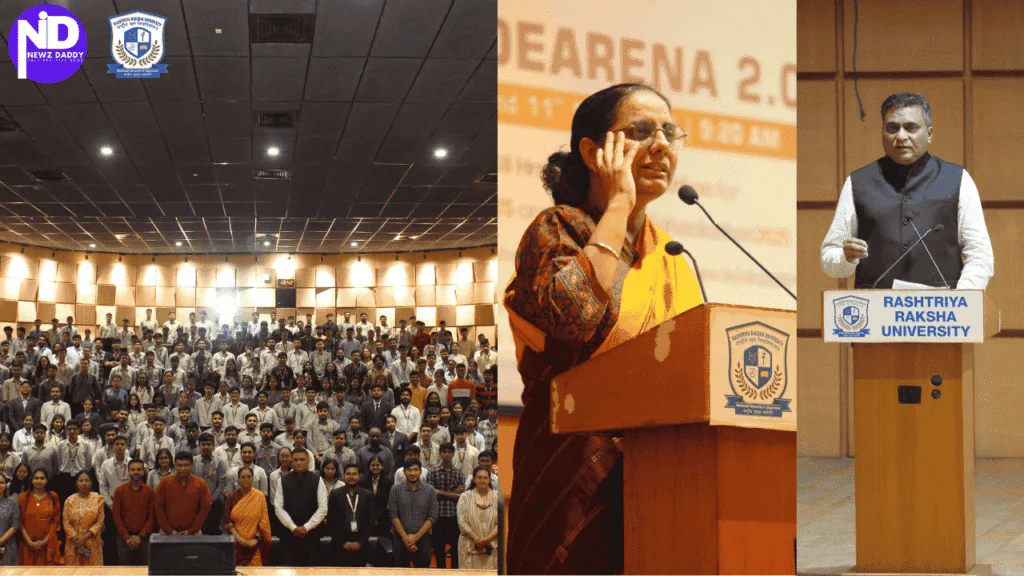RRU Smart India Hackathon: Students Ready For Big Tech Challenge
Newz Daddy Educational Updates
The School of Information Technology, Artificial Intelligence & Cyber Security (SITAICS) at Rashtriya Raksha University (RRU) successfully inaugurated CODEARENA 2.0 – Internal Smart India Hackathon, a 48-hour innovation marathon where students will compete across multiple domains such as Software Development, Artificial Intelligence, Blockchain, Digital Forensics, and Hardware & IoT solutions.
Hackathons like Smart India Hackathon (SIH) are supported by the government to help students solve real problems in society. SIH started in 2017, and it brings many institutions and industry experts together. This helps students learn beyond books by doing.RRU is known for its focus on security, training, and technology, especially in cybersecurity and digital forensics. SITAICS is one of its newer schools, aiming to build strong skills in these fast-growing fields.
The inauguration ceremony, held on 10th September, was graced by esteemed dignitaries including Dr. Jasbirkaur Thadani, Dean of the University; Dr. Chandresh Parekha, Director, SITAICS; Mr. Vivek Joshi, Assistant Director, SITAICS; and Mr. Poojan Shah, SPOC Coordinator of SIH. The event witnessed the presence of all SITAICS faculty members, 39 student teams comprising 234 participants, and dedicated volunteers.Having 39 teams and 234 students shows growing interest. Many colleges have seen larger student numbers in similar events in recent years because students like hands-on challenges more.
Volunteers and faculty play big roles. They guide, mentor, help with logistics, and make the event run well. This helps students focus. The ceremony began with a welcome address by Dr. Chandresh Parekha, who extended warm greetings to all participants. He traced the journey of hackathons, emphasising how such platforms are uniquely designed to address real-time industry challenges. He encouraged students to channel their creativity, innovation, and perseverance in tackling the diverse problem statements.
Many hackathons now include challenges from companies, government ministries, police, and technology firms. Real problems are used (for example, from the real world of law enforcement or digital security) so solutions can be useful. Creativity + perseverance are important because in hackathons, time is tight, teams face bugs, and need to test prototypes fast. Delivering the keynote address, Dr. Jasbirkaur Thadani highlighted the psychological aspects of facing hackathons, underlining the importance of team collaboration, persistence, and resilience in solving real-world problems posed by government bodies, ministries, and industry partners.
Students often feel stress, but resilience (never giving up) helps. Also, working in a team teaches communication, dividing work, and helping each other. These skills are useful later in jobs. In SIH events, teams that have prior practice in hackathons tend to better handle time pressure, debugging, and pivoting ideas when needed. Students were also briefed on the shifting nature of recruitment processes, where leading companies are increasingly preferring hackathons and Capture-the-Flag (CTF) challenges over traditional aptitude and programming tests, reflecting the growing importance of hands-on innovation and problem-solving skills.
Many tech companies now use hackathons or coding challenge platforms to scout talent. This gives students a chance to show their work rather than only grades or tests. Capture-the-Flag (CTF) contests test digital security skills and problem-solving under constraints. This is growing, especially in cybersecurity hiring. Participants were further motivated by a showcase of highlights from CODEARENA 1.0, inspiring them to push boundaries and achieve impactful outcomes.
Seeing prior winners or past solutions helps students know what sorts of ideas work. It builds confidence. Also, changes from CODEARENA 1.0 may include more refined judging, better support, and more domain diversity. The event concluded with a Vote of Thanks by Mr. Poojan Shah, SPOC Coordinator of SIH, who expressed heartfelt gratitude to the University Management for their constant support and guidance and acknowledged the efforts of participants, faculty, and volunteers in making the inauguration a memorable success. Good coordination between organisers, the university, the faculty, and students leads to better event outcomes. Such events also strengthen community ties on campus.
Over the next 48 hours, students will engage in intense coding, innovation, and collaboration. The best-performing teams from CODEARENA 2.0 will be selected to represent RRU at the National Level Smart India Hackathon, showcasing their solutions on a larger platform. Furthermore, the SITAICS (School of Information Technology, Artificial Intelligence, and Cyber Security) department at RRU consistently provides and has historically provided technological expertise and knowledge transfer to various State Police forces.
Representing RRU at national SIH gives exposure to bigger competition, more mentors, and possibly industry recognition. Winning teams might get funding or internship chances. Knowledge transfer to state police forces means students/researchers work on real crime tech, forensics, and cybersecurity tools. This makes learning more practical and socially useful.
Must Read:
Rashtriya Raksha University Starts Essential Musician Course

